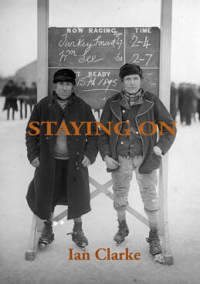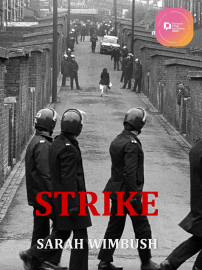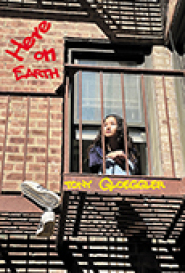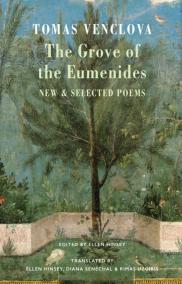
Ian Clarke, Staying On,
Vole Books, 2024, ISBN: 978-1-9917101-03-5, 27pp, £7.99.
Ian Clarke is a poet of place. The place in question is the Fenlands, but not exclusively so. Calderdale in West Yorkshire and Colehaven, a creek in Essex are referred to as well. The Fenlands predominate , however, and specifically where he was brought up, Wisbech, a market town which is actually in Cambridgeshire but close enough to Norfolk to feel like East Anglia. This topographical focus has endowed his work with a unifying theme through all his collections, of which this is the third. The poetry of place figures literally at times, place names figuring as leitmotifs in the structure of the book as a whole. The title of one poem is given simply as 'Wolferton'. Place names carry as much weight as images of the natural world, as in the following:
Ice feathered days warm to a close,
then out to the path to Heacham and Snettisham,
Stubborn Sand and Vinegar Middle.
But even more than landscape and genius loci what distinguishes Clarke’s poetry are the people of the Fens. In this respect his work, particularly in Staying On, bears comparison to the early poems of R S Thomas and his vignettes of farm workers.
While it is wrong to always assume that the biographical subject and the writer are synonymous, in the case of Staying On one can safely claim that what we have here is an autobiographical project. Largely the poems concern people, long passed away, who figured significantly in Clarke’s early life, (providing another major theme of the book). Only two of these people are named: Kate, whose relationship to Clarke is not made clear and Mr Tuckwood, a fondly remembered schoolteacher. The remainder are presented anonymously. There is a Wisewoman (a healer and hawker “she was door-to-door with an armful of samphire”) a Fen Shepherd and a Fenland skater. They register almost as archetypes. Others are remembered simply by their interactions with Clarke, their quotidian routines and habitual actions tenderly recorded.
The predominance of human subjects ensures that one poem in the collection stands out for its lack of such a focus. ‘February Snowdrops’ is an unfiltered take on the natural world itself. Human presence is suggested but not explored.
The opening stanza reveals an unpopulated world:
Close the curtains,
shut out the dark,
the fox hunted red raw,
keep out the wind ribbed sea,
a gale rinsing rock to shingle,
shingle to sand
Evidence of humanity here is confined to the inanimate and the only sentient being is an animal. The imperative voice is maintained throughout. This of course implies someone addressing someone but they remain invisible. The effect and atmosphere of the poem is reminiscent of the middle section of To The Lighthouse, where the perspective is confined to an abandoned house. The poem is brought to a nuanced but memorable close through the classic device of personification enlivened by a kinaesthetic energy:
winter’s last breath drained to a shudder,
as spring star bare and perfect
hatches between frost and roses.
This collection is a slim one, comprising only 15 poems but they more than compensate for lack of volume by their individual and cumulative power. All the poems without exception are outstanding. No material is included to merely fill out the book. That this is the case makes Staying On even more exceptional. Such a claim does not solely rest on the poems being finely crafted, though they undoubtedly are but more than that Clarke is an intuitive poet, his approach not reductive solely to technique. Sometimes he applies lines like brush strokes, slipping free of syntactical and semantic confinement and pursuing an arrangement that is associative, as in the following lines:
the wisp of your smile
as you drew faces on paper, slate –
the silence of snow.
There is a sparseness and a restraint about the writing that is appropriate to the thematic unity of the collection and yet it is sinewy too, a lean unsentimental toughness that evokes the people and the landscape portrayed. Rhetorical effects are subtle, skilfully avoiding the danger of becoming stilted. His regular use of half rhymes contributes to such delicacy:
as silence deepened
to a funeral sky frozen shut,
lilies loosening in a silver cup.
In the same way, internal rhyme adds to the impact of a line without becoming clunky: ‘his scythe raw and sharp, wet with thistle sap.’
While these poems sit comfortably on the page, their euphony and aural richness are only fully realised when read aloud. Poetry of this calibre needs to be heard.
As noted already, the primary unifying theme in Staying On is loss but the consolation of keeping the dead alive through our memories of them also figures throughout. In ‘Fen Shepherd’ a dead person is portrayed like a revenant not in horror but in continuing companionship:
I expect to see him
rise from the patience of stone, mischief in his eyes,
elbowing out the cold dark,
to take my hand,
to show me the dead of winter,
stars never seen from town.
With these consummate poems, both elegiac and celebratory, Ian Clarke establishes himself unequivocally in the first order of poets. I strongly urge anyone who reads this review to invest, as sales people like to say, in a copy of Staying On. This is a book to own. Its qualities are perennial and will continue to provide all the pleasures and consolations of poetry that one could possibly look for.
David Mark Williams
To order this book click here
David Mark Williams writes poetry and short fiction. He has two collections of poetry published: The Odd Sock Exchange (Cinnamon, 2015) and Papaya Fantasia (Hedgehog, 2018).
Sarah Wimbuh, Strike,
Stairwell Books, 2024, ISBN 978913432805, 86pp, £15.00.
Sarah Wimbush’s previous collection (Shelling Peas with My Grandmother in the Gorgiolands, Bloodaxe, 2022) has been reviewed in an earlier edition of The Lake. It was a pleasure to hear Wimbush present her latest book in June, at Leeds Lit Fest, where she read from this collection of poems responding to archive photographs of the 1984 Miners’ Strike, once again, drawing on aspects of her heritage to provide an authentic and thought-provoking read. Stairwell Books are to be commended for taking on publication of this unusual format, which places the black and white photos in conversation with the poems they generated, presented in a larger than usual format for a poetry book.
Wimbush describes herself as ‘a fan of poetry-film’ and this is pertinent in an ekphrastic collection; there was always a sense that she was allowing the images to ‘speak’ for themselves, and just suggesting one possible translation or interpretation of their narrative, while leaving space for the reader to find their own response. Wimbush is not committed to political hectoring or didacticism; she even allows for sympathy or at least a desire for understanding to be extended to all who suffered – and died – during this turbulent process, including those who were attacked transporting working miners, and scabs, such as David Wilkie (‘Death by Strike’). There were no winners here, and Wimbush’s inclusive approach is more persuasive than any polemical writing. That said, ‘Silver Birch’ offers twelve lines of eloquent invective against ‘Maggie’s Judas … a blacklegging cow-towing yowl’ (the accompanying photo is a portrait of ‘Chris Butcher, Bevercotes’ working miner.’)
The opening pages offer a dedication to ‘all the men, women, boys and girls and lived and died in the pursuit of coal’ and she names all the ‘last pits’ that were closed by Ian MacGregor in collusion with Thatcher’s intention to break the union. ‘Mack the Knife’ is commemorated in a ‘found’ poem, ‘Standards’, which collates the messages on banners and badges: ‘Solidarity forever … Close a Pit, Kill a Village … Maggie’s Boot Boys … If the Tories get up your nose: Picket.’
The opening prose poem, ‘Our Language’, is reminiscent of Wimbush’s portrayal of collective identity in Shelling Peas (in that instance of her Romany heritage). It is powerful in its use of two anaphora: ‘This is the tune of the haulage boys and shot-firers and Elvis impersonators, their legs smashed to bits at the bottom of shafts and the women who feed everyone’s children … It is black lung and unwritten songs. It is soup kitchens, work vests, hewers. Picks.’
The women of the strike are given voice, too; their loyalty and resilience and cheerfulness captured in the images and mirrored in the poems: a miner’s wife from Maltby, South Yorkshire is
… hybrid rose –
her eyes, anthracite on fire,
her lips, the curve of a pickaxe.’ (‘Woman Against Pit Closures’)
and ‘Our lady of the Pit Canteen’ avoids sentimentality in the anonymous woman standing hands on hips addressing a table of men emptying their plates, assuring them
‘…I’ll ‘ave tha guts fa garters
if them dishes aren’t brought back!
An impressive achievement, Wimbush’s book is highly recommended not only as a contribution to the documentation of a key period of British social and political history, but for her ability to create such subtle and engaging poetry from a dark subject. Each reader will find their own favourite, both among the poems and the images (I found the chiaroscuro effect of the photo ‘Voting to end the strike with no agreement’ utterly absorbing, with just one face half-visible amidst the raised hands, and Wimbush’s ‘Coal Kid’, with its series of questions, is an effective dialogue with the skinny kid in a jumper coming back from the chip shop.) Buy a copy; read and re-read – and also read the pictures, which are so vital a part of this collection.
Hannah Stone
To order this book click here
Hannah Stone is the author of Lodestone (Stairwell Books, 2016), Missing Miles (Indigo Dreams Publishing, 2017), Swn y Morloi (Maytree Press, 2019) and several collaborations, including Fit to Bust with Pamela Scobie (Runcible Spoon, 2020). She convenes the poets/composers forum for Leeds Leider, curates Nowt but Verse for Leeds Library, is poet theologian in Virtual Residence for Leeds Church Institute and editor of the literary journal Dream Catcher. Contact her on hannahstone14@hotmail.com for readings, workshops or book purchases.



